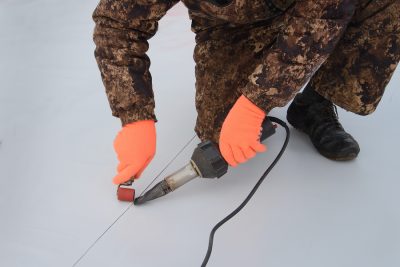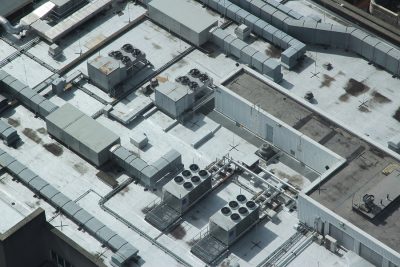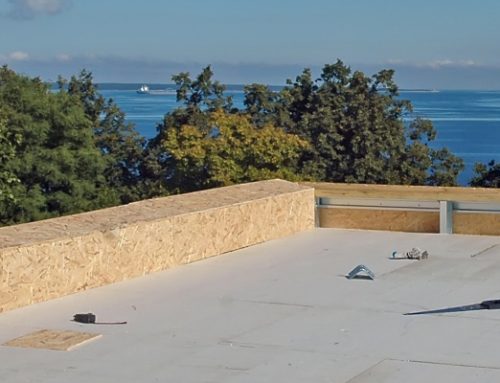As TPO roofing gradually makes its way to the top of the single-ply membrane market, more commercial owners are getting curious and asking, “What is TPO?”
When it comes to your building, there are several things that you should never skimp on, and one of them is your roof. The reasons for this are very apparent but most important of all is the fact that your roofing system plays an enormous role in protecting your property and everything that it holds from the damaging effects of the elements.
A failing, leaky roof can compromise your safety and is often the precursor to expensive water damage issues. And while a responsible building owner addresses roof damage at once, a wise one invests on a quality commercial roofing system that would work without fail for years.
With TPO fast becoming a favorite choice for flat commercial roofing, one can’t help but wonder, “Is really everything that it’s cracked up to be?” Well, if you want to know more about TPO membranes, you’ve come to the right place!
What is TPO roofing?

TPO membranes can be welded at the seams.
Over a decade ago, commercial roofs were generally covered with either PVC or EPDM membranes. However, roofers have recurring issues with these two types of rubber roofs. EPDM is not weldable while PVC is brittle. Perhaps it is these flaws that lead to the development of a third option: TPO.
TPO is an acronym for Thermoplastic Polyolefin. This type of single-ply membrane is produced using ethylene propylene and a mix of fillers, including fiberglass and talc.
It was in the ’90s when builders and manufacturers started to realize TPO’s potential of becoming an excellent roofing membrane. The material’s flexibility makes it easy to work with and suitable for almost any type of commercial low and flat roofing structure. Moreover, it could be welded at the seams for an unbroken connection between panels.
But if TPO has been around for decades, why is it only getting renown recently? The thing is, The TPO membranes we know today is a product of years of study and development of the original formula. In fact, there are still on-going researches on how to further improve it.
What are the available TPO roofing color options?
TPO membranes typically come in white, black, and grey color variations. However, some manufacturers also produce them in other more exciting color varieties.
Energy-efficiency is one of the best characteristics of TPO membranes. Recent advancements in TPO technology has made all color variations energy efficient but white remains to be the most popular color option for places with warm and sunny climates because of its high efficiency in reflecting and emitting heat. Cooler areas, on the other hand, can benefit black TPO membranes as they are better at insulating the building against cold weather.

White TPO membranes are popular in areas with warm climates.
How much does TPO roofing cost?
Now here’s a question you’ve been wanting to know the answer to.
The easiest way to get an estimate is to call a reputable local roofer or consult an online roofing calculator. Your total TPO roofing installation costs will depend on a number of factors.
-
Material
Perhaps, the most significant upside to installing a TPO roof is – wait for it – the cost! You may not have expected this, but it’s true! TPO is one of the most affordable roofing material today – even cheaper than EPDM and other rolled rubber roofing options.
-
Labor
Of course, installing a TPO roof would require the help of professional roofers. The truth is, apart from the material, labor will compose a large chunk of the costs. While newer roofers may charge less, you’d want to opt for experienced roofing contractors with more years in the industry.
-
TPO Membrane Thickness
Thicker TPO membranes are more expensive. However, going for premium quality is said to be the more economical choice. It’s believed that thicker membranes last longer and are more durable. Because they are more resistant to punctures and weathering, spending more upfront may result to lower repair costs in the future.
-
TPO Adherence Options
When installing a TPO roof, contractors choose among three types of TPO roofing adherence. TPO membranes can be attached using specialized adhesives, mechanical fasteners, or through a ballast system. According to the experts, the special adhesive route is the most durable but also the most expensive.
Those who have the TPO roofing budget to splurge, you know what adherence option to choose!
-
Season
Roofers charge more for their services during summer and spring seasons which are usually the busiest. If you’re trying to save on TPO roofing installation costs, here’s a tip: schedule it in early spring or late fall. You’re welcome.
Are there any TPO roofing problems I should be aware of?
Three of the most attractive advantages of TPO roofing are cost, energy efficiency, and the number of available installation options. However, like everything else, it has drawbacks that need some thinking about.
Inconsistency in Quality
This may seem a bit laughable but yes, believe it or not, TPO manufacturers produce ~ wildly ~ different products. What this means is that you may get impressive quality from one brand, and be utterly disappointed with another.
Unproven Claims
How long does a TPO roof last?
A general estimate puts the life span of TPO roofs somewhere in between 15 to 20 years. But here’s the deal: TPO roofing systems are relatively new to the market, and they have yet to prove if they’re going to last for as long as their manufacturers claim they would.
As a newcomer in the single-ply membrane market, TPO roofs still have a lot to prove. These drawbacks, however, can be avoided. This is a no-brainer, but just in case you need reminding, only buy from trusted manufacturers. Most important of all, hire a roofer with a proven track record of delivering quality jobs every time.
Need a Roofer in Toronto ON?
We hope that this article has shed some light and gave you a better insight on TPO roofing – the good, the bad, and those in between.
On the chance that you need a roofer in Toronto or surrounding areas, you might want to consider the experienced team we have here at Cox Roofing Solutions.
If you have any more questions about TPO or other commercial roofing materials and installation, we’d be delighted to help.





